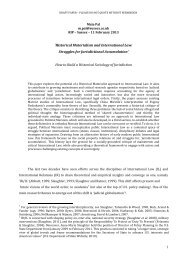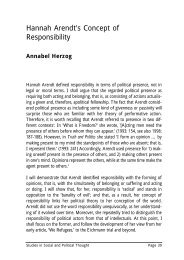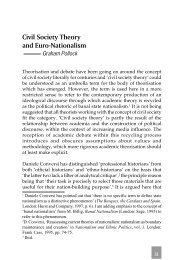Just a Matter of Choice? Student Mobility as - University of Sussex
Just a Matter of Choice? Student Mobility as - University of Sussex
Just a Matter of Choice? Student Mobility as - University of Sussex
You also want an ePaper? Increase the reach of your titles
YUMPU automatically turns print PDFs into web optimized ePapers that Google loves.
decision-making. What is more, an<br />
interesting point about Tim‟s c<strong>as</strong>e is that he<br />
emph<strong>as</strong>ises his girlfriend‟s previous<br />
mobility experiences for making them go<br />
abroad – he himself barely mentions travel,<br />
etc. during his childhood in his story and<br />
also admits to having never been abroad<br />
for a longer period <strong>of</strong> time before he started<br />
studying in the UK. This suggests that<br />
mobility capital can even exert its influence<br />
– at le<strong>as</strong>t via the „strong‟ link <strong>of</strong> a<br />
relationship – on other people, thus<br />
allowing someone with little mobility capital<br />
to pr<strong>of</strong>it from another person‟s rich<br />
endowment <strong>of</strong> it, which is an interesting<br />
advancement to Murphy-Lejeune‟s idea.<br />
Distancing oneself from others<br />
However, among those interviewees who<br />
went abroad more or less subsequent to<br />
finishing their schooling (and had thus not<br />
studied at a tertiary level in Germany), there<br />
are also some who barely mention friends,<br />
partners or academics in their initial<br />
narrative. And even if they do, these<br />
references do not have the same „event<br />
character‟ <strong>as</strong> in the examples given above.<br />
Only in the further course <strong>of</strong> the interview,<br />
when the respondents were <strong>as</strong>ked to<br />
expand on specific episodes <strong>of</strong> their<br />
narration, did „others‟ start to appear. At<br />
first sight, this might seem contradictory to<br />
the proclaimed social embeddedness <strong>of</strong> the<br />
process, but the following p<strong>as</strong>sages<br />
attempt to show that, even in these c<strong>as</strong>es,<br />
„others‟ played an important role in bringing<br />
about student mobility – albeit in a different<br />
guise. The following quote comes from the<br />
interview with Björn, who first did an<br />
apprenticeship after his Abitur in his home<br />
town in North Germany and then started<br />
studying in the Netherlands (and not in<br />
Italy, which he also considered). Being<br />
<strong>as</strong>ked to recount again in more detail how<br />
he ended up going to Groningen, he reflects<br />
on the p<strong>as</strong>t situation in the following way:<br />
At the time, my brother w<strong>as</strong> studying in<br />
Ireland and doing an internship in the<br />
Netherlands. […] The brothers <strong>of</strong> two<br />
friends had also studied abroad and<br />
had come back by then, I mean, whilst I<br />
w<strong>as</strong> doing my apprenticeship, these<br />
two men came back. They had been<br />
abroad studying for four years […] and<br />
only seldomly came back. They were<br />
simply straight after their degree – just<br />
like my brother, by the way – all three<br />
were back home living with their<br />
parents and looking for a job in the<br />
region. That w<strong>as</strong> my perception at the<br />
time – they were such a long way away,<br />
they never came home in between, they<br />
were idealising their home lives, and<br />
this w<strong>as</strong> one <strong>of</strong> the re<strong>as</strong>ons why I didn‟t<br />
go to Italy, but to Groningen. It w<strong>as</strong> not<br />
so far away, it meant I could come and<br />
go in between <strong>as</strong> I liked and I continued<br />
to see how life developed for my<br />
parents. […] I could develop my own life<br />
story in a relaxed manner, compared to<br />
my brothers and the others. (Björn)<br />
The important point here is not that his<br />
older brother and the two brothers <strong>of</strong><br />
friends had been abroad (and thus might<br />
have been positive role models for him), but<br />
that his choice <strong>of</strong> where to go to is explicitly<br />
made in contr<strong>as</strong>t to them. In comparison to<br />
the quotes before, these „others‟ do not<br />
represent something to be followed, but<br />
rather something which is perceived <strong>as</strong><br />
undesirable or to be avoided. The next<br />
quote provides another example <strong>of</strong> how<br />
studying abroad can be related to<br />
distinction vis-à-vis others. Since Heike had<br />
not applied early enough to start studying in<br />
the UK directly after school, she „treated<br />
herself to a break‟, <strong>as</strong> she expresses it,<br />
while waiting for <strong>of</strong>fers from British<br />
universities, and, just to fill in time,<br />
attended university courses in her home<br />
town <strong>of</strong> Heidelberg. At one point in her<br />
story, she links her experiences there and<br />
the experiences <strong>of</strong> older friends to her<br />
intention to study in the UK:<br />
[…] well, the two semesters I spent<br />
studying in Heidelberg, actually<br />
confirmed to me that it w<strong>as</strong>n‟t what I<br />
wanted, because I found it a bit... it<br />
w<strong>as</strong>n‟t tangible enough, I have to say.<br />
What attracted me to the UK w<strong>as</strong> the<br />
system, it w<strong>as</strong> e<strong>as</strong>y to understand,<br />
12

















